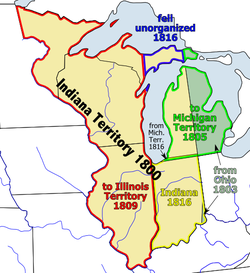A
bill is passed to divide the Northwest Territory and the Indiana Territory is created. The
capital was Vincennes, the oldest settlement in Indiana territory, and William
Henry Harrison, who would become the 9th President of the United
States, was made governor of the Territory less than a week later.
After Ohio,
Michigan and Illinois were formed (in
1803, 1805, and 1809), various areas in Indiana, particularly those near the
Michigan line and in Wayne County, by the Ohio line, wrote to the government
protested the distance of Vincennes from the rest of the people which made it
difficult to conduct business with travel times so far. In 1813, the capital was moved to Corydon. After a few years, complaints about the
distance again surfaced. It was decided in 1820 to move the capital to a more
central location and in 1821, the city of Indianapolis was founded just for
this purpose.





